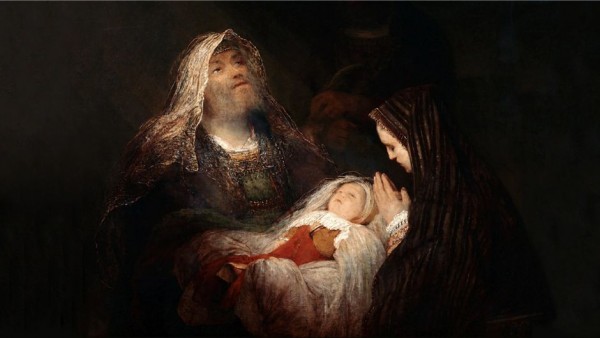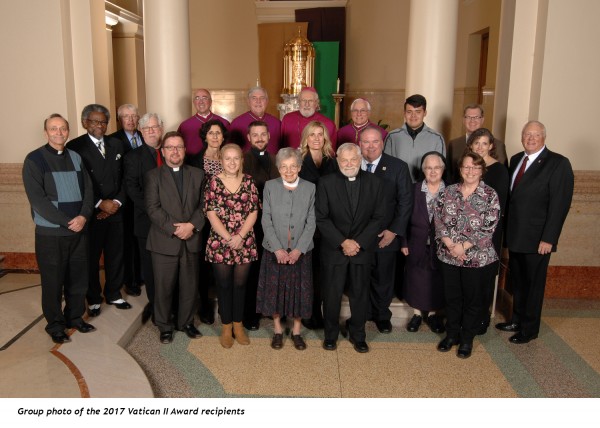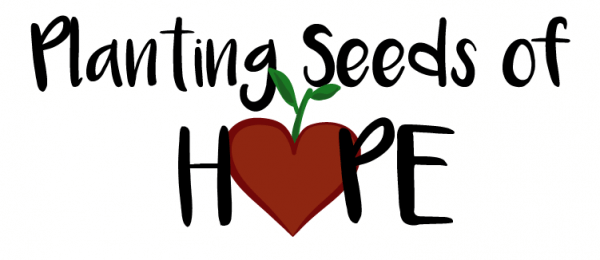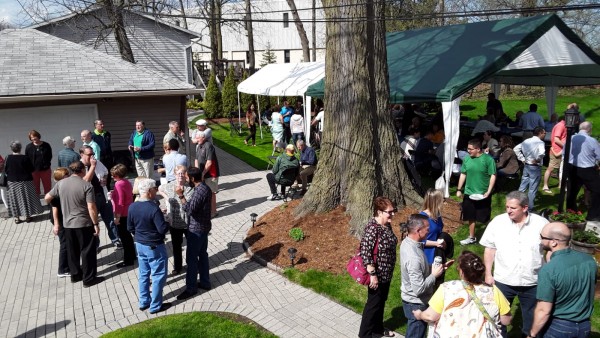
Instead of the 4th Sunday in Ordinary Time, this weekend we will be celebrating the Feast of the Presentation of the Lord—also known as the Feast of Candle Mass. This fact causes us to miss what we would have read on ordinary Sunday, the synagogue's response to Jesus' programmatic speech. After reading the quote from Isaiah that Jesus had read with all intention, after omitting a verse where the day of God's vengeance against the enemies of Israel was announced, after a dialogue with the assembly in which Jesus says that he is not surprised that he is not a prophet in his land—Jesus will suffer the first attempt against his life: “When everyone in the synagogue heard this, they became furious and, rising up, threw him out of the town and took him to a precipice of the mountain on which his people were built, with the intention of throwing it off the cliff” (Luke 4:29-29.)
The gospel of the Presentation of the Lord rewinds history and places us back in Jesus' early childhood. It sounds like one of the stories we read at Christmas. Not in vain, traditionally this holiday used to mark the end of the Christmas season. Mary and Joseph, observant of the Law, take Jesus as their first son to be presented in the Temple. Many of the “themes” of the Christmas gospels emerge: Jesus is taken to the Temple, the institution that will end up executing him; we witness the reaction of those who meet Jesus—during Christmas we saw the reaction of the shepherds, of Herod, of the Magi—now we see the reaction of the elders Simeon and Anna. It is very possible that the meeting of these elders fulfills the same function that the episode of the Epiphany fulfills in the gospel of Matthew.
It is curious that this Anna carries the same name as Samuel's mother. No doubt Luke wants his readers to make this connection, which first century Jews, the first to receive this gospel, would have made almost automatically. The two women see how God fulfills their hopes: receiving a son—Samuel—and the Son: Jesus.
In Simeon's words we detect a connection with the reaction of the people in the synagogue in Nazareth. Simeon proclaims that this child will be “glory to Israel” but also “light to all nations.” The universality of Jesus and his message will always be a problem for nationalist fanatics—both in Nazareth and in places closer to home. And to Mary he says, “This child has been appointed for the ruin and revival of many in Israel, as a sign that will cause contradiction, so that the thoughts of all hearts will be revealed. And a sword will pierce your soul.” In the synagogue Jesus has begun to be a “sign of contradiction.”
Understanding Jesus as a stumbling block, as a sign of contradiction, can be a fruitful topic. Moreover, it is easy to fall into the temptation of only understanding Jesus as a sign of contradiction against the “world” or the “culture”. But, what would Jesus say to us, personally, that would provoke a reaction of deep rejection in us? What things that we believe absolutely would Jesus question? What kind of challenges would he present to us if he showed up in the middle of our assembly any Sunday like he did on the Sabbath in the synagogue of his native land?
In the spirit of this fest day in which candles are blessed, we ask the Lord to continue illuminating our lives, our contradictions, and to continue giving light to all our darkness.
In early May, the CSP held a small event for some supporters in the Milwaukee area. The theme for the evening was “Planting Seeds of Hope.” For this, we prepared a short video that provides a general overview of the different ways that the CSP, together with our friends and supporters, help to plant seeds of hope in the different places and ministries where we work and are present. Here is the link to that video.
http://youtu.be/gZ4WqEXVPhk
We hope our readers may enjoy it as much as those who were present at the event in Wisconsin, last month.
On May 5, the members of the Community of Saint Paul living in Racine organized an Open House for friends, colleagues and benefactors that live in the area. About 300 people stopped by during the afternoon in order to visit the home and office of the Community, as well as to meet other members of the CSP, and to receive news and information on the different projects we are carrying out. Visitors had the opportunity to enjoy some delicious Mexican food – fitting, as it was “Cinco de Mayo”. We were also blessed beautiful weather! We thank all those who came to this event.
Reflection on the Feast of Candlemas
On February 2, the Feast of Candlemas, my parents, who have been married 59 years, usually attend the annual celebration Parents of Alumni of the Marists Brothers’ school in Badalona (Spain). On that day, we commemorate the presentation of Jesus in the temple. It is a special day because in many places spouses also renew their marriage vows, and World Day of Consecrated Life is celebrated. This beautiful feast prompted me to write this reflection.
The presentation of Jesus at the temple by his parents was an act of obedience to the Law of Moses, according to which a child had to be presented at the temple 40 days after his birth. February 2 is, of course, 40 days after Christmas. According to the Law, the first born son of each home belonged to our Lord, and parents had to present the child and pay a ransom for him at the temple.
The presentation of spouses at the temple, to renew their marriage vows with each other and the Lord, is very appropriate for this day. So, too, is the celebration and renewal of vows for those who have consecrated their lives to God. Like the first born of each Jewish family, they also belong to the Lord. This belonging of believers is characterized by fidelity.
Sometimes it seems that fidelity, the “forever” option, is not in style nowadays, except for those who want tattoos. In a time like ours, where options are abundant, with a great range of opportunities and many open doors during the trajectory of one’s life, it has become difficult to choose definitively one road over everything else. Isaac Riera, MSC, wrote about “the weakened will” and claimed that “modern man is full of stimulation, sensations and desires, but lacking in willpower”. Perhaps this explains the lack of perseverance in some marriages and even the decline of vocations to a consecrated life.
Nowadays, fidelity has for some a negative undertone, as if it were a value of bygone days, related to resignation and prohibitions. However, it is actually a free, beautiful and creative exercise. Faithfulness is a choice, a promise, a fundamental option, whether it be as a couple, to children, to a principle or to a profession. It implies coherence with oneself and perseverance to face many obstacles.
Bishop José Grullón, of San Juan de la Maguana in the Dominican Republic, speaking recently about perseverance to a group of couples who were happy with their marriages, posed the following question to them: “What is better, to win someone’s love or to preserve it?” To the response of many that “to preserve” is better, he explained that “to preserve love” is to leave it frozen, paralyzed. On the contrary, “to win someone’s love” is something that must be done every day. The Spanish songwriter Victor Manuel says it in one of his songs: “Day to day I grow within, because I love you. I keep fanning the fire”.
Today, Candlemas, we remember our fundamental option and our fidelity, a creative and renewed fidelity. It is a faithfulness that we pursue day to day, every day, fanning the fire to keep alive the flame. Because our choices and fundamental options, not just our tattoos, are forever.

The CSP was honored with the Vatican II Award for Service to the Missions, given by the Archbishop of Milwaukee

On Tuesday, November 7, 2017, the Community of Saint Paul was honored by Archbishop Jerome Listecki of the Archdiocese of Milwaukee with the Vatican II Award for Service to the Missions. The Vatican II awards were established in 1991 to honor men, women and young adults who exemplify the Catholic Church’s vision set forth in the Second Vatican Council.
The criteria named for receiving the award are that the recipients have promoted Jesus’ mission and witnessed to God’s presence among the diverse people and cultures of the world; have a desire to share the Gospel; and show mutuality in mission (giving and receiving) and a spirit of justice, prayer and joy.
Traditionally, the Vatican II Awards are given to individuals. This is the first time that the award is presented to a collective. There were 14 other individuals and couples who this year also received the Archbishop’s Vatican II Award in different areas for distinguished service and contributions to the Church and society. The Archdiocese of Milwaukee is the Community’s canonical seat, and the CSP has its headquarters there. We are grateful for this honor from Archbishop Listecki and the Archdiocese of Milwaukee
21/08/2015 -
REFLECTIONTHE BREAD OF LIFE DISCOURSE (II)Martí Colom“Is this not Jesus?” Following the meditation published a few days ago, we continue reflecting on the Bread of Life Discourse, which extends itself for most of chapter six of John’s Gospel and we have heard at Sunday Mass during the past few weeks. In verse 6:24 we are told that one of the resistances that Jesus found in those to whom he proclaimed the Good News was based on nothing less than in his closeness to them. He identified himself as bread from heaven and they responded murmuring, “Is this not Jesus, the son of Joseph? Do we not know his father and mother?” They ask themselves, filled with wonder, how can he bring us something new if he belongs here, if we have always known him, if he is one of us? Beyond these questions (which begin with the mention of Jesus’ name, as if his well-known identity was the strongest argument to discredit his message), there is a deeply rooted tendency not just of those who listened to him 2,000 years ago, but even of many today: the tendency to think that when God manifests Himself in our lives this will necessarily happen by way of extraordinary signs and spectacular events completely foreign to our daily experience. We refuse to accept that God may come to us tip-toeing, through ordinary people, through those we have closest. Yet, this is exactly what happens. Perhaps many of us are more in debt than what we would like to admit to superstitious and magical ways of thinking, out of which we automatically associate God’s presence to the super-natural and everything that is grandiose, foreign and incomprehensible. It seems to us that our daily experience simply cannot be the scenario or the means for God’s action. Jesus, of course, comes to challenge this mentality and to claim back the richness and sanctity of everything ordinary, and to suggest that his own closeness to those he lived with (in short, his humanity) it was not, neither then nor now, an obstacle for him to be living bread for all. If we try to be his followers we must understand that each and every one of us is also called to be bread of life for others: from our simplicity, from our rootedness to our own cultures, from our personalities more or less integrated, even from our many limitations, from our fears and hopes. A careful reading of this passage, finally, will help us to discover God’s footprint in places where we perhaps were not looking: in the father and the grandfather that give me advice, in the children who question my ideas, in the wife whom I love, in the sick person that I visit, in the friend to whom I open my own heart, in the neighbor that helps me, in the coworker I see every day, in the brother with whom I pray together and in the poor person who I perhaps tend to ignore instead of finding, in him as well, my bread of eternal life.
18/08/2015 -
REFLECTIONTHE BREAD OF LIFE DISCOURSE (I) Martí Colom
Food that endures forever In the Sunday Masses of these last few weeks we have heard portions of the “bread of life discourse,” in which Jesus insists over and over again that he is food for all. It is a long section of John’s Gospel, one that begins after the scene in which Jesus feeds a crowd with five loaves of bread and two fish (Jn 6:1-15) and then covers the rest of chapter six until its ending (6:71). I would like to reflect a bit upon two moments of this chapter. The first is Jn 6:27, when on the day after the multiplication of the loaves Jesus talks to the same crowd he has fed and tells them: “Do not work for food that perishes but for the food that endures for eternal life”. Beyond the more spiritual (and certainly appropriate) interpretation, according to which with these words Jesus wants to underline the importance of living with our eyes fixed on horizons that go beyond the present world, it seems to me that the text also allows for a more practical or “earthly” interpretation. Jesus sees the crowd: they have gone after for him because they had been given to eat. He immediately understands that a relationship of dependency has been created between the crowd and himself. They are, let us remember, the same men and women from whom he moved away because “they were going to come and carry him off to make him king” (6:15). Jesus knows that no dependency is good, that the Father wants us to be free, autonomous. That is why he encourages them to work for the bread that endures forever. “The food that perishes” is the nourishment that others have to give you, for you do not know how to generate it. Someone offers it to you, you eat it and right away you need to extend your hand again asking for more. The food that endures forever is the nourishment that one knows how to produce, which therefore allows someone to be autonomous. The food that never ends is analogous to the interior spring of living water that Jesus promised to the Samaritan woman (Jn 4:14), which will free her from having to go to the well day after day. Jesus is inviting those around him to discover their own dignity, to experience God’s presence in themselves, and thus to understand that they have no need of any king, chief or charismatic leader with answers to every question, since they have in themselves the potential to move on, in their own right. To make this discovery is to find the bread that endures forever. This passage can thus shed light over the way in which we live our faith and carry out our ministry. It can help us to understand that every time that we, as priests, religious or committed lay people create dependencies from those whom we serve towards us, then we are using criteria that are very different from those of the Gospel. Our mission is the same mission that moved Jesus: to help those we serve so that they can discover their own capacities to grow and evolve (as difficult as this may be). To proclaim the Gospel is, above anything else, to help individuals become aware of their own worth as loved sons and daughters of the Father. That is why our message is a liberating one: because it implies the realization of God’s presence in oneself –the living bread that endures and the spring of water that never ends. Obviously, it will then be desirable that from a situation of healthy autonomy we may be willing to link our lives to the lives of others, forming community with them. It would indeed be very sad if we were to use our newly obtained autonomy to lead selfish and individualistic lives, with an air of “since I am capable to provide for my own needs, then I am interested in no one else.” But this is a risk that we must run, because what is undeniable is that only free persons, working for the bread that endures forever, will be able to create a Christian community worthy of this name. Individuals who are dependent on the bread that perishes may form tribes, clans, gangs, sects or caricatures of family, but never authentic communities living the Gospel of Jesus. In a later reflection we will meditate on the other moment of the bread of life discourse that we wanted to comment.




